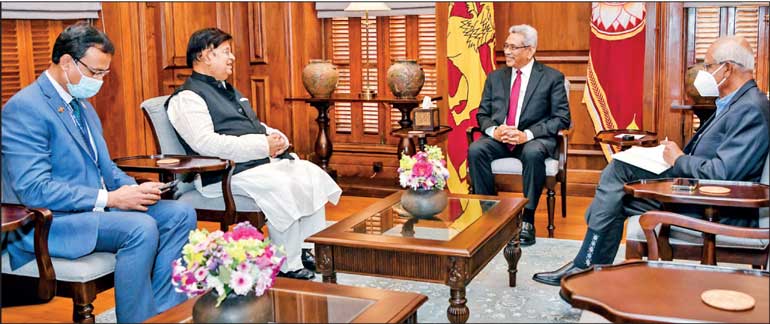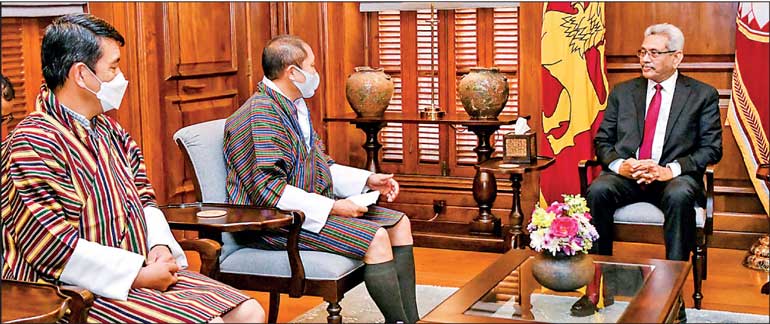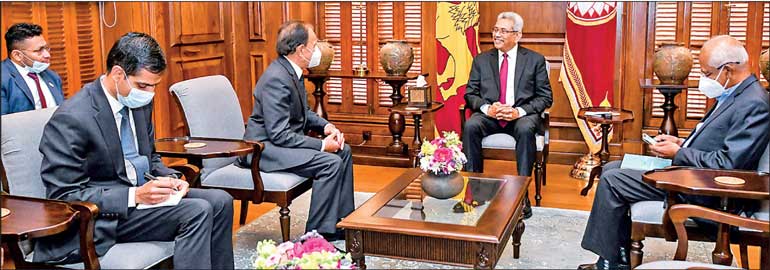Sunday Feb 15, 2026
Sunday Feb 15, 2026
Thursday, 31 March 2022 00:00 - - {{hitsCtrl.values.hits}}

Bangladesh Foreign Minister AK Abdul Momen

Bhutan Foreign Minister Tandi Dorji

Nepal Foreign Minister Narayan Khadka
By Ganeshan Wignaraja, Nihal Pitigala, Selim Raihan and Prabir De
The COVID-19 pandemic closely followed by the Russia-Ukraine conflict has fundamentally changed the economic recovery outlook for the world. The world economy is entering a new, more uncertain era characterised by heightened geopolitical, economic, and pandemic risks. Many South and Southeast Asian countries, particularly small countries, are highly vulnerable to these risks and face a worrying outlook of slower growth, diminished market opportunities, rising inflation and rising poverty.
South Asia looking east and Southeast Asia looking west offers a pathway to mitigate multiple risks and to exploit opportunities to trade-led growth in Asia, a potential that remains largely untapped. International experience suggests that effective regional governance is necessary for economic development and achieving peace dividend.
BIMSTEC offers a unique forum for its South Asian and Southeast Asian members to work together for mutual benefit. Established as recently as 1997, BIMSTEC is a relatively new regional organisation by global standards. Its seven members cover a diverse range of geographical, historical, cultural and developmental backgrounds and circumstances. Its significant potential is underlined by BIMSTEC members accounting for as much as 22% of the world’s population and about 4% of the world’s GDP. Its members have proceeded gradually and carefully to build the institution and foster regional cooperation in a step-by-step manner. For instance, in 2014 a permanent secretariat was established in Dhaka headed by a secretary general with seven country directors from the members. Several priority sectors of cooperation were identified, and recently rationalised to seven broad areas, and some BIMSTEC centres were set up on priority subjects for the region.
The much-awaited fifth BIMSTEC Summit among heads of state or governments, hosted by Sri Lanka in March 2022, was a landmark event in BIMSTEC history. The Summit has made a significant contribution towards closer regional economic integration. The key outcomes include approval of the BIMSTEC Charter, BIMSTEC Master Plan for Transport Connectivity and the BIMSTEC Convention on Mutual Legal Assistance in Criminal Matters. Members also committed to finalise important agreements to facilitate transport and peoples’ movement as the group will work towards the finalisation of the BIMSTEC Coastal Shipping Agreement and the Motor Vehicles Agreement.
Seamless sustainable multi-modal transport links and synergy with other connectivity frameworks like the ASEAN Master Plan on Connectivity 2025 are what the BIMSTEC needs in the post-COVID era. Improving trade facilitation can also speed up the BIMSTEC integration process. Accordingly, moving to a regional single window in customs and a paperless trade regime can help to reduce trade costs and facilitate cross-border business.
More has to be done, however, to build on these achievements and position BIMSTEC as an effective organisation tuned to the needs of the new and emerging more uncertain era. For a start, there is the longrunning unfinished agenda item of concluding a BIMSTEC FTA which has been under negotiation since 2004. A comprehensive BIMSTEC FTA can help to reduce barriers to trade and investment and assist the business to join global supply chains.
The region displays significant complementarity between the members that bodes well for mutually beneficial trade. The foundation of BIMSTEC’s economic growth has been the rules-based open multilateral trading system. Therefore, we must bring the BIMSTEC FTA to a successful conclusion within a reasonable timetable. Along with it, the FDI must move freely in the region if we want to promote national growth as well as the regional and global value chains.
Furthermore, significant work is needed to prepare BIMSTEC members to embrace the potential of the fast-moving digital economy. This means investment in 5G technologies and related infrastructure, a business-friendly regulatory approach to e-commerce and investing in digital skills. Promoting greater gender equality in education and the workplace for women to have the same opportunities, and are paid the same as men for equal work. It will foster jobs, income and entrepreneurship across BIMSTEC countries.
Fulfilling the economic promise of BIMSTEC charter and the proposed development agenda under the ‘new normal’ may not be achieved without empowering the BIMSTEC Secretariat. The Secretariat needs to be adequately resourced and has sufficient delegated powers to fulfil its role as a coordinator of activities across BIMSTEC members.
One should not downplay the significance of the fifth BIMSTEC Summit in Sri Lanka. BIMSTEC leaders and officials deserve congratulations for important outcomes. The time is ripe for fresh thinking on BIMSTEC’s priorities and institutional capability for the new era. Until this is achieved and implemented, BIMSTEC may remain a work in progress as a regional organisation short of meeting the aspirations of the member countries and their peoples.
(Ganeshan Wignaraja is a Non-Resident Senior Fellow at the National University of Singapore, Nihal Pitigala is a Senior Fellow at InReach Global, Selim Raihan is the Executive Director of SANEM and Prabir De is a Professor at the Research and Information System for Developing Countries.)